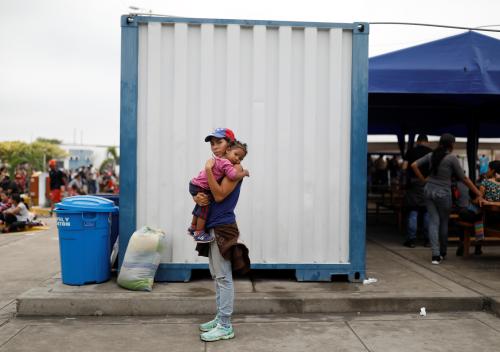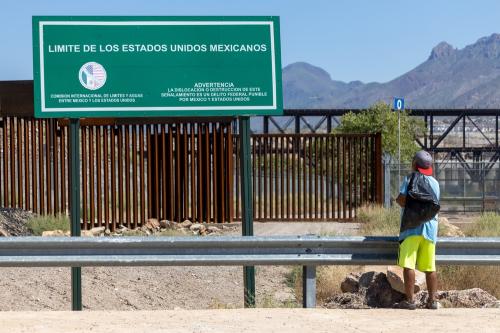Colombia is about to embark on one of the largest-ever humanitarian gestures in modern history: Providing a 10-year, renewable, regular migratory status to over 1.7 million Venezuelan refugees living within its borders, about 3.3 percent of its population—a figure that is remarkably similar to the share of undocumented immigrants in the United States.
The United States is smart to follow suit by following President Biden’s plan to provide an eight-year path to citizenship to undocumented immigrants.
The most common argument against such a move is that allowing immigrant workers to transition to the formal labor market (because it should be obvious to all by now that most immigrants already work informally) would hurt labor outcomes of Americans. But significant evidence proves that this is not the case, including my recent work with Ana Maria Ibañez and Sandra Rozo that shows an earlier wave of regularization in Colombia barely had any effect on the labor indicators of Colombians. And for those who remain worried about immigration and crime, evidence shows that providing immigrants a regular status drastically reduces their incidence of committing crimes, which is typically very low –lower than for natives—to begin with.
Many benefits come together when providing a regular migratory status to undocumented immigrants. Namely, finally eliminating the risk of deportation allows immigrants to invest in themselves and their communities for the long term, allowing them to find better and more stable jobs, pay payroll taxes, perhaps even save more by simply having access to bank accounts, and consequently invest in the future of their children.
There’s no reason to think that all this wouldn’t apply in the U.S. context.
Many Colombian government officials have said they take these steps not only because they feel a historical responsibility with their Venezuelan neighbors, who hosted millions of Colombian immigrants in the 1990s, but also because they understand that the integration of Venezuelans into their society will enormously benefit the country economically.
In the U.S., offering a regular migratory status to millions of undocumented workers is not only smart, but also a very popular move. According to Gallup, for the first time in years, a majority of Americans think that the country needs more, not less, immigration. Similarly, there is vast public support for this particular policy: Over 65 percent of respondents said that the United States should allow undocumented immigrants to remain and become U.S. citizens.
Of course, this type of amnesty should come hand in hand with enough resources to complement labor markets as they absorb workers transitioning from the informal to formal sectors. These resources would ideally go to expanding the provision of public goods such as roads, electrical grid, schools, and hospitals, as well as to facilitating access to credit for firms in areas where many immigrants will be looking for new opportunities. It is this investment that would allow the firms to expand, grow, and create more jobs for both natives and immigrants (not to mention that many credits can also go to immigrant entrepreneurs, whose typical firm creates more jobs than natives’ businesses). Despite the minimal amount of resources Colombia has received from the international community to do this (as compared to other refugee crises), and the need to devote many of these resources to humanitarian needs, the Colombian government understood the importance of injecting capital into the economy to maximize the benefits of immigrant integration. In 2019, they launched over $230 million in credit lines for infrastructure and investment in areas with high refugee density. While likely not enough, it is still a smart policy that has not received the attention it deserves.
This, precisely, is another reason why it’s a no-brainer for the U.S. to follow the steps of Colombia when it comes to providing a path to citizenship for its undocumented immigrants. This is true particularly now, as trillions of dollars are expected to flow to the economy as part of the America Rescue Plan. Many of these funds will reach small and medium businesses all around the country allowing them to expand and hire workers, both U.S. and foreign-born. (Of course, many firms might decide to keep hiring undocumented workers illegally to avoid paying benefits, but, at the very least, the workers will now have the power to demand otherwise and search for other employers, like any other normal person with rights). This important inflow of capital to small and medium businesses, together with the big push on infrastructure planned by newly-confirmed Transportation Secretary Pete Buttigieg, should provide enough of a capital injection in the formal economy to go hand in hand with the increase in the supply of workers who will now be able to participate in the formal economy.
The stars are aligned for pursuing a policy that is smart, popular, and frankly, moral: Americans thrived throughout the COVID-19 pandemic, in part, thanks to many of these undocumented immigrants serving in essential occupations. With all the challenges that the current administration is facing, this long overdue policy might signal—perhaps more than anything else crossing President Biden’s desk—that America, indeed, is back.







Commentary
The US can learn a lot from Colombia about giving rights to undocumented immigrants
February 22, 2021